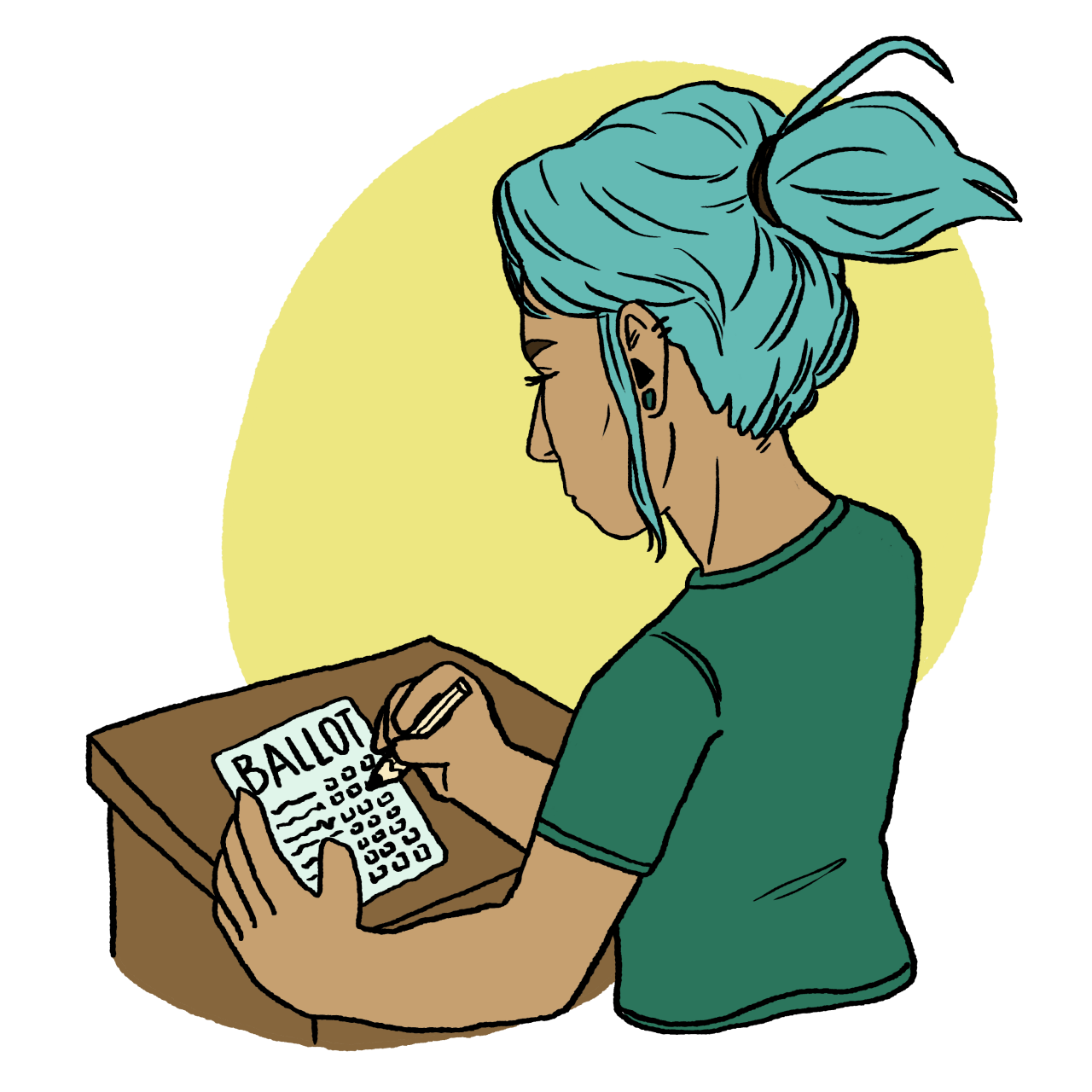illustration by Ren Rader
Before I begin, I want to make it clear that I not only understand the opposing viewpoint here, but I deeply sympathize with it. I honestly do not want to vote; no sense of civic pride is welling up inside of me, no great sense of hope or optimism. Instead, I feel a great apathy resting in my bones, as I struggle to find a way to prove that my vote will count.
When the election is brought up in the circles I am a part of, it is always accompanied by a sigh of exasperation, or a stillness which is only attributable to the sound of all the air being sucked out of the room. Few are excited by either candidate. When the argument is made for voting, it is always on the premise that you must “vote for the lesser of two evils.”
But that’s nothing new, is it?
Every election, we Americans are given the choice between two parties that do not serve popular interests. The Democratic party, once the champion of labor, has abandoned its former working-class base in favor of serving what economist Robert Reich called “symbolic analysts,” that horde of former yuppies who voted for the third-way politics of Clinton in the ’90s. The Republican Party, meanwhile, has begun to rely on blood-and-soil nationalism to rally a group of disenfranchised white voters into thinking that the color of their skin makes up for the relative squalor they are living in; that, somehow, it is immigrants’ fault, as if the source of that immigration were not linked to the “free trade” policies of Republican politicians from the Reagan government onward.
With both political parties embracing the concepts of free-market fundamentalism, and with economic disparities growing worse day by day, it’s hard to want to vote in favor of either party. After all, to vote for a candidate who is bound to enact a policy that you don’t agree with on moral grounds seems to feel like you are cosigning every act of repression that they author. What’s more, there seems to be a growing recognition that the state itself, with its power to kill with total impunity, is problematic, as shown by the aggressive uses of force placed on the civilian population in the last few months, as well as the lack of justice given to agents of the law who misuse their force.
And yet, fully knowing both the problematic nature of the state and the failure of partisan politics to promote actual representative change, I still wholeheartedly and aggressively support and recommend voting. Why?
Because the act of voting draws you into the social and political realms — realms which are not as distinct as many realize. For many, their first time thinking critically about their social and political surroundings comes when they choose to vote for the first time. When you commit to voting, you commit to the act of investigation into your surroundings. You set yourself on a mission to try to influence your social world, and in the process, come to learn more about that world. In many ways, voting entails a sort of learn-as-you-go process, getting a feel for the game and its rules only by getting out there and playing it.
The biggest barrier to effective political action, whether through formal electoral mechanisms or through non-statist, popular measures, is a lack of understanding as to what your real interests are as both an individual and as a community. Voting means that you must begin to reflect on what those interests are, where the course of your individual biography merges with that greater arc of our collective history. It means talking to other people about your shared dreams, desires, and fears, and coming to understand what you hold in common. In sum, it means growing a sense of community, as well as growing critical thinking abilities.
This reflexive ability, this knowledge of where you fit into the social world, is often lacking in many of the people who need it most: the downtrodden, the marginalized. Those who hold in their hands the levers of power do not hold this weakness; instead, they hire financial planners and lobbyists to promote their interests on a constant basis. Voting is a first step, a gateway drug, for promoting a sense of reflexivity and solidarity. Perhaps it is necessary for people to exhaust all means of legitimate governmental action before they realize that it is more effective to fix their problems themselves.
As I end, I would like to point out that, as with all things, this model of voting-as-consciousness is much more effective and politically viable in smaller, local races. It is in the hometown community that people can know the issues that require immediate addressing. It is at the local level that you can meet your representatives face-to-face — after all, it is very unlikely that I will ever meet either Donald Trump or Joe Biden personally, and I thank God for that. And it is in your hometown that you can begin to know your neighbors, your community, and your common interests.






